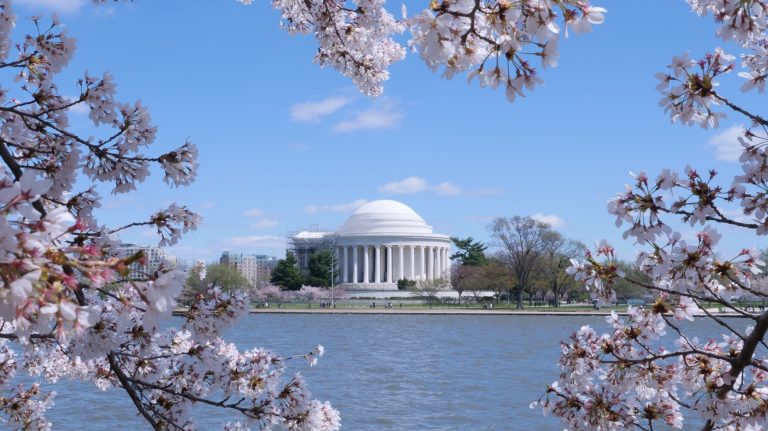“We hold these truths to be self-evident, that all men are created equal, that they are endowed by their Creator with certain unalienable rights, that among these are life, liberty and the pursuit of happiness.” This idea has inspired people around the world for more than two centuries.
April 13 is the birthday of Thomas Jefferson (April 13, 1743–July 4, 1826), one of America’s greatest Founding Fathers. When he was 33 years old, Jefferson wrote the “Declaration of Independence,” going on to serve as Governor, Ambassador to France, Secretary of State, Vice President, and finally two terms as U.S. President.
It was George Washington who set the presidential precedents for the nation, while Thomas Jefferson had put tremendous effort and wisdom in those important public positions.
Inscribed in the Jefferson Memorial, it says, “I have sworn upon the altar of God, eternal hostility against every form of tyranny over the mind of man.” Jefferson also said in 1811 that“The last hope of human liberty in this world rests on us ”.
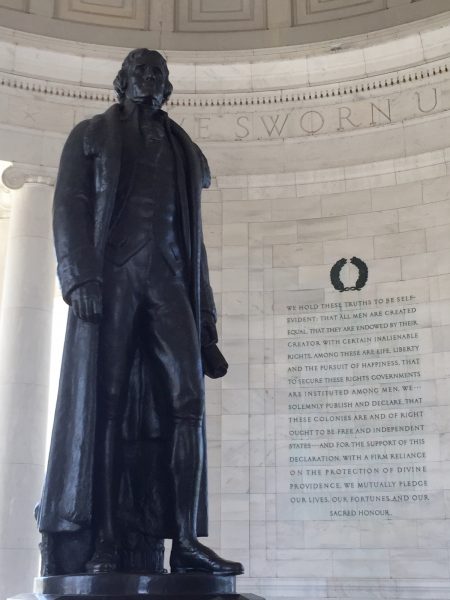
After people have experienced chaotic situations since the COVID outbreak in early 2020 and confronting the ever-increasing threat from the Chinese Communist Party, we have even more to learn from what Jefferson practiced, reflected and predicted two centuries ago.
“Endowed by their Creator with certain unalienable rights ”
Success
You are now signed up for our newsletter
Success
Check your email to complete sign up
At the Jefferson memorial, there stands the sentence “No American did more to ensure the advancement of Enlightenment ideals as the nation took shape than Thomas Jefferson. No legislator did more to embody those ideals in law, both for his state and for his country.”
“We hold these truths to be self-evident, that all men are created equal, that they are endowed by their Creator with certain unalienable rights, that among these are life, liberty and the pursuit of happiness.” The Declaration of Independence has inspired people in all the countries around the world till now.
After his resounding assertion of “inalienable rights” in the “Declaration of Independence,” Jefferson returned to Virginia and set out to revise the state’s legal system “with a single eye to reason and the good of those for whose government it was framed.”
The Virginia Statute for Religious Freedom
The Virginia Statute for Religious Freedom stands as one of the great defenses of intellectual freedom:
“Whereas Almighty God hath created the mind free; that all attempts to influence it by temporal punishment or burthens, or by civil incapacitations, tend only to beget habits of hypocrisy and meanness, and are a departure from the plan of the Holy author of our religion,” the Statute says.
In 1786, Jefferson wrote, “It is comfortable to see the standard of reason at length erected, after so many ages during which the human mind has been held in vassalage by kings, priests, and nobles; and it is honorable for us to have produced the first legislature who has had the courage to declare that the reason of man may be trusted with the formation of his own opinions.”
In 1783, Jefferson was chosen as a delegate to the United States Congress by the legislature of Virginia. During six months of service, he drafted a number of important state papers, including the formal ratification of the peace treaty with Britain. In May 1784, Jefferson was appointed Minister Plenipotentiary to join Benjamin Franklin and John Adams in negotiating commercial treaties with European nations.
In 1785, Jefferson was appointed to succeed Franklin as Minister to France, having served there for four years — a skillful diplomat, negotiator, and keen observer of European affairs and the approaching French Revolution.
The next year, Jefferson presented America’s cause to Europe. He anonymously circulates both his own Notes on the State of Virginia and the Virginia Statute for Religious Freedom, passed that year by the Virginia Assembly.
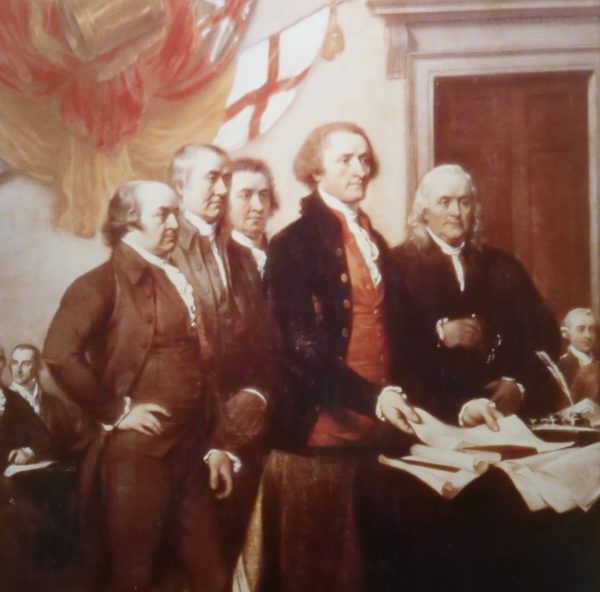
As minister to France during the American Revolution, Benjamin Franklin was a fixture in the intellectual gatherings in Parisian salons. When Jefferson succeeded Franklin, he also became popular in that circles, interpreting the new American vision and for the old world in Europe.
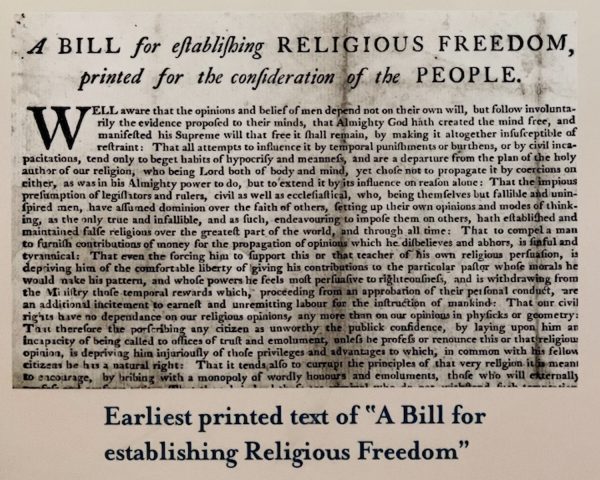
Signed the bill that outlawed importation of slaves to the United States
On June 1, 1777, during the Revolutionary War, Jefferson was elected governor of Virginia. Jefferson repeatedly tried to end or at least to limit slavery. In some cases, he prevailed. At his urging, Virginia’s legislature banned the further import of slaves and made it easier for slaveholders to free individual slaves.
In Congress, his proposal to prohibit slavery in all the western territories after 1800 failed by only one vote. As President he signed the bill that outlawed importation of slaves to the United States.
In 1796, coming in second after John Adams, he was elected Vice President under the electoral rules then in force. As presiding officer of the Senate, Jefferson wrote a Manual of Parliamentary Practice still used today.
Doubled the size of America by Louisiana Purchase
When America was founded, the Midwest belonged to France. In 1803, Jefferson sent James Monroe to France to negotiate for New Orleans. The treaty signed in April gave the United States the entire Louisiana territory — as the Midwest was called — for approximately $15 million. Because Napoleon’s decision to sell Louisiana, America doubled the size.
After the triumph of the Louisiana Purchase, Jefferson’s re-election was a foregone conclusion.
Pay attention to public education
After leaving office, Jefferson bade farewell to public life and returned to his Monticello. Reflecting on his experiences in the founding of the United States and his presidency, he wrote that “the enormities of the time in which I have lived, have forced me to take a part in resisting them, and to commit myself on the boisterous ocean of political passions. I thank God for the opportunity of retiring from them without censure and caving with me the most consoling proofs of public approbation.”
America’s founding fathers knew that one of the essentials to pass on and preserve freedom is education. Thomas Jefferson wrote in 1816, “If a nation expects to be ignorant and free, in a state of civilization, it expects what never was and never will be .”
The Jefferson Memorial notes that “Thomas Jefferson’s reputation as ‘a masterful pen’ was well established among his contemporaries. John Adams noted that everything Jefferson wrote was marked by ‘a peculiar felicity of expression.’”
“But there was more than stylistic elegance here: the substance of Jefferson’s voluminous legal writings, philosophical musings, and personal correspondence was supported by lifelong habits of contemplation, careful study, and meticulous note taking. ”
Jefferson was recognized internationally as a patron of learning. He served as the president of the American Philosophical Society for 17 years and was associated with the major American learned and agricultural societies, and with scores of societies in Europe. He corresponded with an extraordinary number of scientists and philosophers, engaging in “the brotherly spirit of Science.”
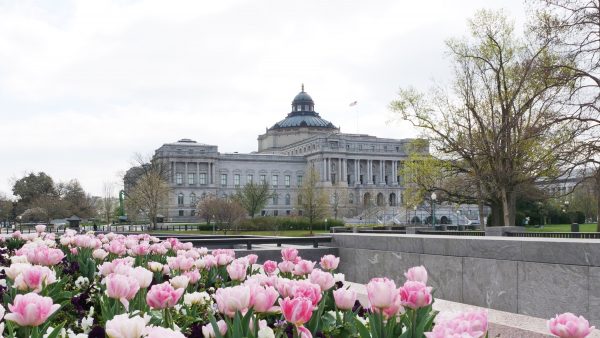
Another contribution from Jefferson to public learning was that made to the reconstruction of the Library of Congress. When the invading British army burned the Capitol in 1814, they also burned the Library of Congress. Jefferson offered 6700 volumes of books to replace those lost. With works on architecture, the arts, science, literature, and geography, in French, Spanish, German, Latin, and Greek, Jefferson’s donation far expanded the scope of the library.
Today, the comprehensive collecting policies of the Library of Congress and its practice of sharing its collections as widely as possible are linked to Jefferson’s belief in the value of education in a democratic society.
“I have been fifty years making it [a library], and have spared no pains, opportunity, or expense, to make it what it is … [and when in Paris] putting by everything which related to America, and indeed whatever was rare and valuable in every science,” Jefferson said in 1814.
Jefferson owned one of the best private collections of paintings and statuary in the county. Music was even more important to him. One of his first gifts for his beloved wife was a pianoforte ordered from London.
As the presidency of James Monroe began in 1817, Jefferson was busy planning every detail of a new institution of higher education for Virginia. Jefferson personally participated in the architectural design of the University of Virginia campus, presenting the five orders of architecture (Tuscan, Doric, Ionic, Corinthian, and Composite) of ancient Roman buildings. Jefferson reproduced the elements of European traditional arts in the United States and education.
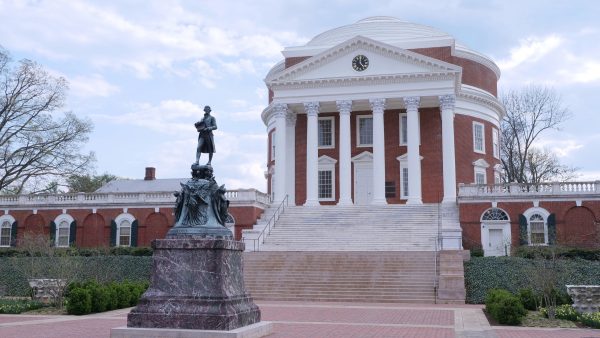
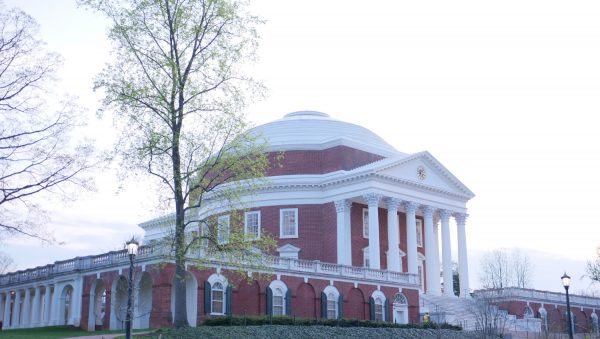
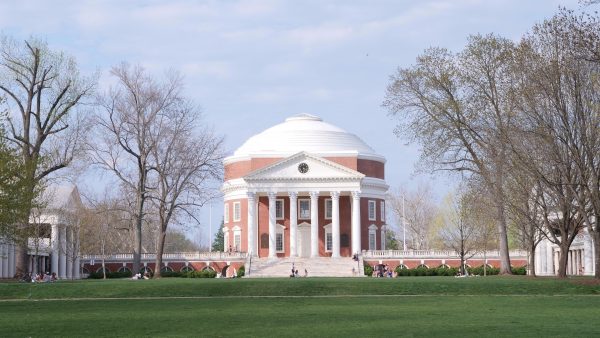
In 1825, the University of Virginia opened with Jefferson serving as its rector.
He said that it “will be based on the illimitable freedom of the human mind, to explore and to expose every subject susceptible of its contemplation.”
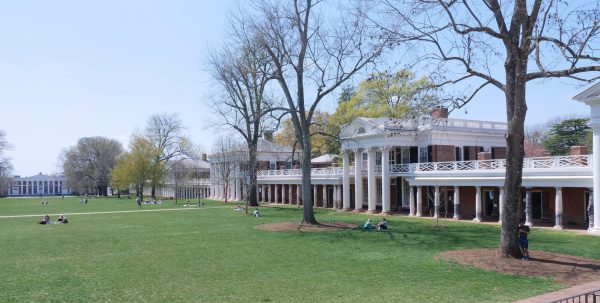
Noble sentiment transcending 50 years
Over the years Jefferson had been friends with four US presidents, from George Washington, John Adams, James Madison, to James Monroe.
George Washington died in 1799. Jefferson, in later letters, showing his esteem for Washington, wrote “… never did nature and fortune combine more perfectly to make a man great . . His integrity was most pure, his justice the most inflexible I have ever known .. . He was, indeed, in every sense of the words, a wise, a good, and a great man. ”
Among Jefferson’s friends, the stories of the 50-year friendship between him and James Madison has been collected in The Book of Virtue .
Both are dedicated to the public and are committed to maintaining a pure and beautiful government system. In the last few months before his death, Jefferson’s correspondence with Madison was still full of noble sentiment in between the lines.
According to The Book of Virtue, Jefferson wrote to Madison, “It has also been a great solace to me to believe that you are engaged in vindicating to posterity the course we have pursued for preserving to them in all their purity the blessings of self-government which we had assisted in acquiring for them.”
“If ever the earth has beheld a system of administration conducted with a single and steadfast eye to the general interest and happiness of those committed to it, one which protected by truth can never know reproach, it is that to which our lives have been devoted.”
“To myself you have been a pillar of support through life. Take care of me when dead,and be assured that I shall leave you with my last affections.”
Madison wrote back to Jefferson, “You cannot look back to the long period of our private friendship and political harmony with more affecting recollections than I do. If they are a source of pleasure to you, what ought they not to be to me.”
“We cannot be deprived of the happy consciousness of the pure devotion to the public good with which we discharged the trust committed to us.”
“And I indulge a confidence that sufficient evidence will find its way to another generation to insure, after we are gone, whatever of justice may be withheld whilst we are here.”
Memorable day of July 4th Three Presidents of the United States were passing away
To Americans, July 4 is a great day, a majestic day, and a glorious day to be always remembered and celebrated.
By issuing the “Declaration of Independence,” The Continental Congress declared that the thirteen American colonies were no longer subject (or subordinate) to the monarch of Britain, and voted to declare independence on July 4th.
On July 4th 1826, 50 years after the Declaration of Independence was adopted, the third President Thomas Jefferson and Second President John Adams, who had put much effort in it, passed away on the same day.
On July 4th, 1831, five more years later, the fifth President James Monroe died.
In his book “The American Miracle Divine Providence in the Rise of the Republic.”, Michael Medved wrote, “The event of that epochal Independence Day suggested the intervention of supernatural forces, mixing death and dedication in such powerful ways that observers of faiths, and of no faith, saw evidence of Destiny’s direction in American affairs. ”
“The last hope of human liberty in this world rests on us”
But after only two hundred years, education has been undermined, history has been tampered with, and people’s minds have been contaminated. The United States is no longer the same country as Jefferson had wished it might become. “The last hope of human liberty in this world rests on us.” To live up to his expectation, we need first learn from that which Jefferson left for us.
The great hope in Jefferson’s vision lies in his belief that people could be nurtured and uplifted. As he said it very well, “Education . . . engrafts a new man on the native stock, and improves what in his nature was vicious and perverse into qualities of virtue and social worth.”



